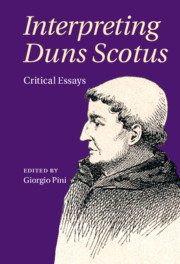Book contents
- Interpreting Duns Scotus
- Interpreting Duns Scotus
- Copyright page
- Contents
- Acknowledgments
- Notes on contributors
- Introduction
- Chapter 1 John Duns Scotus’s life in context
- Chapter 2 The modal framework of Duns Scotus’s argument for the existence of a first cause
- Chapter 3 Duns Scotus on essential order in De Primo Principio and elsewhere
- Chapter 4 Duns Scotus on how God causes the created will’s volitions
- Chapter 5 Duns Scotus on free will and human agency
- Chapter 6 Duns Scotus on the dignities of human nature
- Chapter 7 Duns Scotus on matter and form
- Chapter 8 Duns Scotus, intuitionism, and the third sense of ‘natural law’
- Chapter 9 The bounds of sense: adequacy and abstraction in the later works of Duns Scotus
- Chapter 10 Before univocity: Duns Scotus’s rejection of analogy
- Chapter 11 Analogy after Duns Scotus: the role of the analogia entis in the Scotist metaphysics at Barcelona, 1320–1330
- Bibliography
- Index
Chapter 3 - Duns Scotus on essential order in De Primo Principio and elsewhere
Published online by Cambridge University Press: 23 December 2021
- Interpreting Duns Scotus
- Interpreting Duns Scotus
- Copyright page
- Contents
- Acknowledgments
- Notes on contributors
- Introduction
- Chapter 1 John Duns Scotus’s life in context
- Chapter 2 The modal framework of Duns Scotus’s argument for the existence of a first cause
- Chapter 3 Duns Scotus on essential order in De Primo Principio and elsewhere
- Chapter 4 Duns Scotus on how God causes the created will’s volitions
- Chapter 5 Duns Scotus on free will and human agency
- Chapter 6 Duns Scotus on the dignities of human nature
- Chapter 7 Duns Scotus on matter and form
- Chapter 8 Duns Scotus, intuitionism, and the third sense of ‘natural law’
- Chapter 9 The bounds of sense: adequacy and abstraction in the later works of Duns Scotus
- Chapter 10 Before univocity: Duns Scotus’s rejection of analogy
- Chapter 11 Analogy after Duns Scotus: the role of the analogia entis in the Scotist metaphysics at Barcelona, 1320–1330
- Bibliography
- Index
Summary
This essay focuses on a concept that plays a central role in Duns Scotus’s metaphysics—essential order. It starts by considering Duns Scotus’s presentation of essential order in the De primo principio, where essential order is said to obtain between two beings, x and y, where x is essentially prior to y and y is essentially posterior to x. But Duns Scotus makes use of essential order in several other contexts as well, including his hylomorphism, chemistry, action theory, metaethics, and even ecclesiology. In these other contexts, the notion of essential order is not clearly defined, and it is not always obvious how its deployment is supposed to map onto the canonical definition of essential order offered in the De primo principio. This essay takes a step toward this systematization by analyzing Duns Scotus’s use of essential orders outside of the De primo principio, letting the De primo principio discussion both inform and be informed by these other contexts.
- Type
- Chapter
- Information
- Interpreting Duns ScotusCritical Essays, pp. 59 - 77Publisher: Cambridge University PressPrint publication year: 2022

